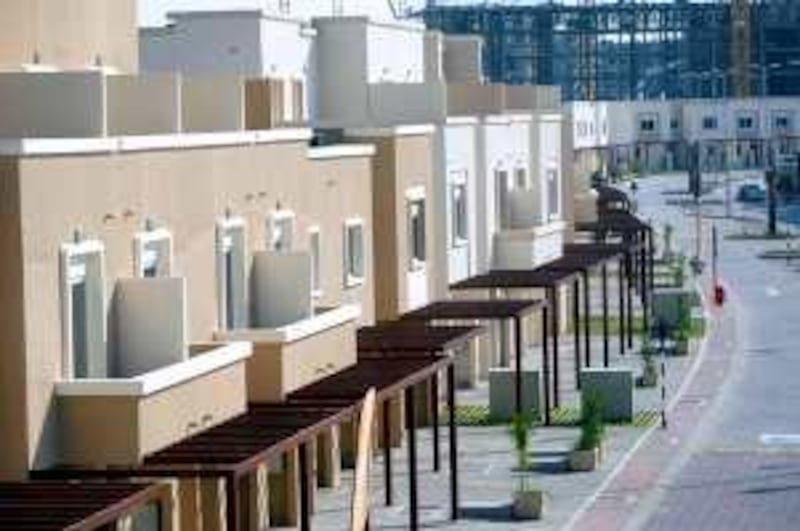It should be an exciting time for homeowners who have waited years for the keys to their new villas. But the rapid decline in prices has left thousands moving into properties that are worth less than the amount they paid.
Now many are feeling the pain as the final handover usually means the first mortgage repayments or the final payment to the developer. At the same time, developers are rushing through completions, often before projects are fully ready to occupy, to book desperately needed revenues. "Some developers obviously do try to speed up the handover because they want their money in," says Charles Neil, the chief executive of the brokerage Landmark Properties. "They say the property is ready but there are still a lot of issues, including in the finishing, for instance."
Tamweel, the country's second-largest home finance company, refused in November to accept the handover of the first completed properties from The Villa development built by Al Mazaya Holding, located within the Dubailand project. Tamweel is the financier and an owner of the estate, which comprises about 200 homes. Khaldoun Abdul Kader, the executive vice president of Al Mazaya, said late last year that the buildings were completed and infrastructure would be finished by the start of this year.
Developers are also starting to hand over new towers within Dubai's Business Bay and Jumeirah Lake Towers developments. "In reality, people can't move in for all sorts of reasons," says Matthew Hammond, the head of agency at Jones Lang LaSalle. "No connection to power, though, is the biggest cause for developers not to be able to hand over." Owners have clashed with developers over handover issues at Business Bay, which was originally planned to include 200 towers.
Many homeowners in the project's 12 Executive Towers paid their final instalments in August before being told by Dubai Properties, the master developer, that they would not be able to move in until late last year. "People have been able to move into some residential units in Business Bay but I am only aware of one of the Executive Towers and the electricity is on the generators," said Porush Jhunjhunwala, the manager of commercial leasing at the brokerage company Better Homes.
"As for the office space, a few landlords are still doing the fitout. No business has moved in. There are still challenges in terms of infrastructure, electricity." Disputes over "snagging", or fixing problems relating to the finishing of new homes, are also becoming more prevalent, brokers say. Investors in Al Reef Villas, a development in Abu Dhabi, have been asked for snagging lists even before their homes have been connected to power and water supplies.
"We started the snags in September for the first phase of the project ?" said Faiza al Zarouni, the chief operating officer of the developer Manazel, late last year. "Yes, power and water connection is under implementation, but obviously we will not hand over to the owners without the utilities." Some residents in the handed over villas of Al Reef, however, are still receiving their power from generators, although they were promised a connection to the federal grid soon.
"The day I came for the first time, I did not know that it was the official snagging but I pointed a lot of defects," says Khawar Sheikh, 35, an Indian banker who moved in last month. "They treated that particular day as the official snagging and I paid the balance." Mr Sheikh says he pointed out several flaws, such as uneven walls, damaged kitchen fittings and broken tiles. "On December 15 I got the key and I said I would be moving in with my family by the 25th," he says.
"But now, even though I have moved in, nothing has been fixed. And I am still getting electricity through generators." Brokers say owners should be especially vigilant of snagging issues and should not accept properties that have not been properly finished. "It is not usual to do the snags without having power and water," says Mr Neil. "You've got to check all the equipment, whether the AC is working or not, for instance. You need to see that the water is running - all this before the handover.
"You should not accept the unit unless the water and electricity have been connected up." Developers are also likely to encounter more problems on buildings where 70 per cent or more of the purchase price is required on completion. "Many buyers have not secured a mortgage for their last payment," says Mr Neil. "That is one of the big issues at the moment. The majority of the payment plans for off-plan properties here include a big payment in the end, after completion, often about 70 per cent.
"The reason the developers did this was to sell, as buyers wanted a small payment upfront to flip the units and make a premium." Some buildings in the Jumeirah Lake Towers development reaching completion are understood to be under this kind of payment plan. Some towers in Abu Dhabi were sold in the same way. "Many investors who bought those properties at Dh2,500 (US$680) per square metre before the downturn thought it was not necessary to get a mortgage," says Susan Cronin, a consultant with Al Jar Properties. "They had a year and a half to resell the property before delivery."
Ms Cronin says securing a mortgage at this price is now close to impossible. "I bought two apartments with a group of seven friends," says Francoise Harris, an investor in the Marina Blue building on Abu Dhabi's Reem Island. "The last instalment of investors was due on completion, which according to the company is December 31. But the building was obviously not going to be ready by that time. We only want to pay on real handover."
For their part, developers say many investors are seeking excuses to delay or avoid making their final payment because they do not have the funds or their homes are now worth substantially less than the price they paid. "People are much more critical," says Markus Giebel, the chief executive of Deyaar Properties, Dubai's third-largest developer. "Sometimes they really look and try to find something wrong, which afterwards can be used against us in order to stall the last payment."
Deyaar's Citadel tower, an office high-rise building in Business Bay, which had a last instalment of 50 per cent due on handover, has been the scene of problems with some owners on delivery. "We have no issues with about 50 per cent of the customers," says Mr Giebel. "But with the other 50 per cent, we have to negotiate." @Email:ngillet@thenational.ae






